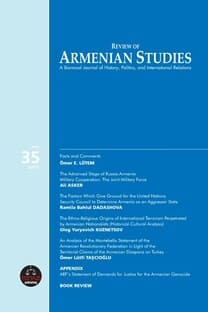THE OTTOMAN GOVERNMENT’S POLICIES CONCERNING THE ARMENIAN SOLDIERS IN THE OTTOMAN ARMY AND THEIR FAMILIESIN THE WAKE OF THE PROVISIONAL LAW OF RELOCATION AND RESETTLEMENT
This article aims to evaluate the conflicting situation that arisesfrom the allegations regarding the killing of Armenian soldiers in theOttoman Army with the enactment of the Provisional Law of Relocationand Resettlement and the existence of a decree issued by the Ottoman Statepertaining to not subjecting Armenian soldiers and their families torelocation.The Events of 1915 is among the topical issues of both the Turkish andArmenian people’s agenda. Armenians persistently attribute the crime ofgenocide to Turkey and the Turkish people. What lies behind the effort tokeep this problem in the agenda is the Turkish people’s rejection of theseaccusations of genocide. This rejection does not stem from the “denial ofthe truth” as alleged by the Armenians, but from the fact that Armenians ignore the necessity of scrutinizing the events of the period according to theprevailing circumstances of that period. In connection to this, the Hermeneuticevaluation of historical documents according to the circumstances of a givenperiod is one of the fundamental principles in historiography. This approach,which prevents false notions of past periods, is accepted as one of theprerequisites for the field of history in becoming a scientific discipline. Withinthe framework of the Events of 1915, Armenia/Armenians, attributing thecrime of genocide to Turkey, claim that men of Armenian descent were killedafter having been enlisted during the First World War. However, the OttomanState, two months after the implementation of the Provisional Law ofRelocation and Resettlement, had issued orders to not relocate soldiers ofArmenian descent and their families.
GEÇİCİ SEVK VE İSKÂN KANUNU SONRASI OSMANLI HÜKÜMETİNİNOSMANLI ORDUSUNDA GÖREVLİ ERMENİ ASKER VE AİLELERİNE YÖNELİK UYGULADIĞI POLİTİKALAR
Bu makale, Geçici Sevk ve İskân Kanunu ile Osmanlı Ordusunda görevli Ermeni askerlerin katledildikleri yönündeki ithamlardan ve Osmanlı Devletitarafından Ermeni asker ve onların ailelerinin sevk edilmeyeceği hakkında alınan kararnamenin mevcudiyetinden doğan çelişkili durumudeğerlendirmeyi hedeflemektedir.1915 Olayları hem Türklerin hem de Ermenilerin gündeminde olan konular arasındadır. Ermeniler 1915 Olayları ile ilgili Türklere/Türkiye’ye sürekli soykırım suçu isnat etmektedir. Ermenilerin bu sorunu gündemde tutma çabasının arkasında, soykırım suçlamalarının Türkler tarafından kabul görmemesi yatmaktadır. Oysaki bu kabul etmeme Ermenilerin iddia ettiği gibi“gerçeğin inkârından” değil, Ermenilerin dönemin olaylarını, dönemin koşullarına göre değerlendirilmesi gerekliliğini görmezden gelmelerinden kaynaklanmaktadır. Bu minvalde Hermeneutik bir bakış açısıyla tarihimetinlerin dönemin koşullarına göre yorumlanması, tarih yazıcılığının temel ilkelerinden biridir. Tarihi yanılsamaların önüne geçecek olan bu yaklaşımtarih ilminin bir bilim dalı olarak temellenmesinin koşullarından biri sayılmaktadır. 1915 Olayları çerçevesinde Türkiye’ye karşı soykırım suçu isnat eden Ermenistan/Ermeniler Birinci Dünya Savaşı’nda Ermeni kökenli erkeklerin askere alındıktan sonra katledildiklerini iddia etmektedir. OysakiOsmanlı Devleti, Geçici Sevk ve İskân Kanunu’nun yürürlüğe girmesinden iki ay sonra Ermeni asker ve onların ailelerinin sevk edilmemesi hakkındakarar almıştır.
